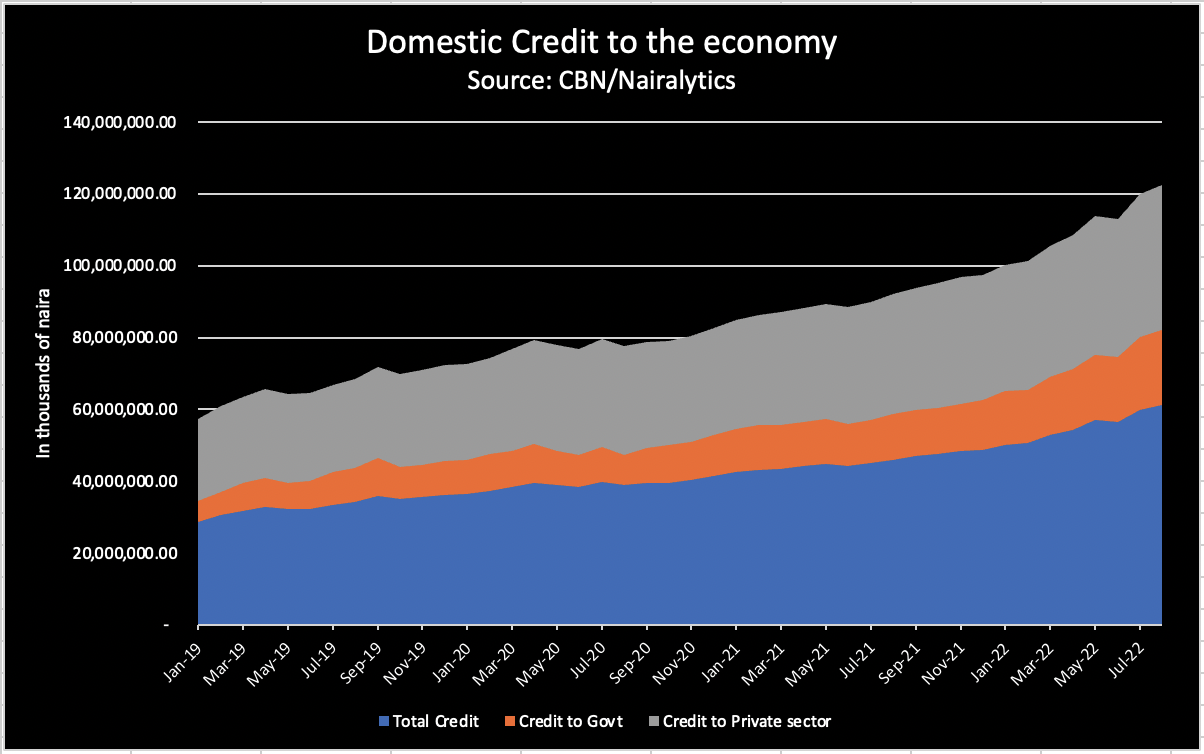Must Read

Nigeria has recorded a total net domestic credit to the economy of N61.1 trillion as of August 2022, the highest on record.
This represents an astonishing increase of a total of about N12.4 trillion or 26% since December 2021 when the country reported N48.7 trillion.
- This is according to data gathered by Nairametrics from the Central Bank of Nigeria (CBN) data on money supply in the country.
The data suggest net domestic credit to the government has been a major driver of credit expansion in the economy.
Total credit to the economy represents all loans issued to both the public and private sectors over a period and is critical to gauging the effect of money supply on the economy.
Credit Boom
The Nigerian economy has experienced a boom in credit over the last three years (see chart above) as the central bank pursued a high lending monetary policy believing this will spur economic growth.
- Much of the growth trajectory has also been attributed to the apex bank’s extension of credit to the private sector.
- The credit boom has often been cited by the apex bank as a reason for the country’s quick exit from a recession in 2020.
- Despite the successes, credit expansion is now viewed as one of the major causes of the country’s galloping inflation which is now over 20.5%.
- This has forced the CBN to reconsider its credit expansion policy choosing to raise rates to reduce inflation.
- A continuous expansion might therefore affect the CBN’s contractionary policy meant to stamp out inflation.
The CBN stated in the last MPC communique that the economic growth trajectory is fueled by credit to the private sector amongst others.
“The economy has thus maintained continuous growth for seven consecutive quarters, following its exit from the recession in 2020. This consistent positive performance was driven largely by the sustained growth in the non-oil sector, particularly services, and agricultural sub-sectors, supported by continued policy interventions, as well as credit expansion to the private sector,” the bank said.
Public sector growth
A cursory review of the data shows sector credit stood at N40.1 trillion and N21 trillion to the private and public sectors respectively.
The data also shows, private sector credit has been the major contributor to total credit to the economy making up 66% of the total.
However, the total growth in total credit to the economy of N12.4 trillion this year was largely driven by credit to the public sector.
- Based on the data, public sector credit which includes borrowings from the states and federal government rose by a whopping N7.1 trillion this year alone representing a 51% rise this year.
- To put this into context, between December 2019 and December 2021 a total of N4.3 trillion was added to credit to the public sector.
- This is mostly attributed to the drastic fall in government revenues recorded this year as oil theft ravaged the economy.
- Nigeria’s central bank data also confirms over N21 trillion has been extended to the government as Ways and Means lending.
Meanwhile, credit to the private sector in year-to-date performance only surged by N5.2 trillion from N34.9 trillion at the end of 2021 to
- This is indicative of a 15.1% year-to-date August 2022 as the private sector continues to suck in more credit.
In case you missed it
Nigeria’s inflation rate surged further to 20.52% in August 2022, from 19.64% recorded in the previous month, representing the highest rate since September 2005.
To combat growing inflation, the apex bank adopted a hawkish approach, raising the interest rate on savings deposits, which can crowd out the money in circulation.
- The CBN directed banks to pay at least 4.65% interest on savings deposit accounts, up from 4.2% earlier. This is due to a 150-basis point increase in monetary policy rates to 15.5% from 14%.
- The apex bank stated that Capital Adequacy Ratio (CAR) and the Liquidity Ratio (LR) remained above their prudential limits at 13.4 and 40.1%, respectively, in August 2022.
Furthermore, there was a noticeable improvement in the non-performing loans (NPLs) ratio to 4.8% in August 2022, compared with 5.0% in June 2022. The apex bank usually tries to ensure that the NPL ratio is kept below its 5% prudential benchmark.
The post Loans to government drives domestic credit to the economy to all time high of N61.1 trillion appeared first on Nairametrics.
-Picsart-AiImageEnhancer.jpeg.png)

